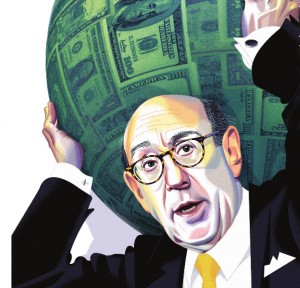'The Picasso Of The Legal Field'
He's either loved or hated for his work -- but from 9/11 to the Boston Marathon bombings, Ken Feinberg is the go-to name in managing disasters.

Image via Observer.
“How’s that for a quote?” asked Judge Jack Weinstein, after delivering the above assessment.
The subject of this admiration is Ken Feinberg, the unparalleled master of disaster relief who administered everything from the 9/11 Relief Fund to compensation for the victims of the Boston Marathon bombing. This week, the Observer put together a terrific profile of Feinberg, speaking to cheerleaders like Judge Weinstein as well as detractors — who brand him as “high-handed and patrician, a press-savvy enabler for flush corporations to dodge costly lawsuits.”

Law Firms Now Have A Choice In Their Document Comparison Software
Love him or hate him, Feinberg charts relatively novel territory in the law, seeking a just balance between the potentially huge upside of the often inefficient and inaccessible court system and the harshness of an insurance carrier. While it can be lucrative — he pulled down $850K a month on one matter — Feinberg sees the job as, often, a public duty — finding the better overall result even if it comes at the expense of a potential windfall verdict one victim might secure.
There is some resistance to Mr. Feinberg’s practice. Even admirers, like David Logan, the former dean at Roger Williams School of Law, warn of the “privatization of justice” that such mediation represents.
“Our tradition has been to have civil disputes in an adversarial system, overseen by an impartial judge with important roles for a lay jury,” Mr. Logan wrote by email. “Ken Feinberg tosses all of that out the window and we are supposed to conclude that it’s simply better to trust him to do it all. Add to that the fact that Ken Feinberg is selected and paid by deep pocket, deeply self-interested defendants.”
I’ve never shied away from criticizing the Supreme Court’s hostility to class action lawsuits and the corresponding decision to imbue mediators and arbitrators with the authority of Odin — this body of law swings deep into the territory of enabling corporate moral hazard — yet, there’s something to the mediation of mass torts that appeals to anyone interested in delivering justice en masse. It probably should be a job for the courts instead of someone often paid by the defendant. But then again, doesn’t the most efficient solution require a specialist who isn’t about to walk away from the case after an hour to hear 25 drug prosecutions?
I’m a little biased, I suppose. Ken Feinberg was one of my favorite professors in law school. He’s also responsible for my greatest law school memory. After one FedSoc bro spent a class berating Justice Breyer’s dissent (technically concurring in part and dissenting in part) in Amchem, Feinberg showed up to the next class and declared in his thick Boston accent that Ben Affleck could only hope to affect:
Sponsored

Law Firms Now Have A Choice In Their Document Comparison Software

Diving Into Generative AI: A Practical Guide For Law Firms Starting From Scratch

Gain An Instant Understanding Of New Complaints With LexisNexis Snapshot

Why Do AI And Legal Professionals Make The Perfect Partnership?

“Last time we were here, [FedSoc kid] back there was criticizing Justice Breyer’s decision in Amchem, explaining how it was ‘unprincipled.’ So I’ve brought Justice Breyer to class today to address these criticisms.”
Breyer proceeded to rip this kid’s logic for the next 15 minutes. It was f**king glorious. It was an actual Marshall McLuhan moment.
In any event, Feinberg’s work does place him in the troubling role of plenipotentiary, but his successes are hard to dismiss:
Mr. Feinberg recalled one woman, the wife of a dead fireman, who came to him and demanded $2 million in 30 days. He said at the time that given the bureaucracy, that was all but impossible. He asked why she needed the money so quickly.
“‘I’ll tell you why, Mr. Feinberg. I have terminal cancer. I have 10 weeks to live. My husband was gonna take care of our two children. Now they’re gonna be orphans,’” the woman said, according to Mr. Feinberg. “‘I have got to get this money while I have my faculties and set up a trust and make sure they’re provided for.’”
Mr. Feinberg managed to get the money to her when she wanted it. “Eight weeks later she died. I have hundreds of stories like that,” he said. His expression remained fixed.
Sponsored

AI’s Impact On Law Firms Of Every Size


Why Do AI And Legal Professionals Make The Perfect Partnership?

How many years would she have had to wait for an Article III judge to preside over her trial? “In Feinberg We Trust” may not be a robust legal standard, but his work provides the foundation for the increasingly complex future of torts.
Meet Ken Feinberg, the Master of Disasters [Observer]







